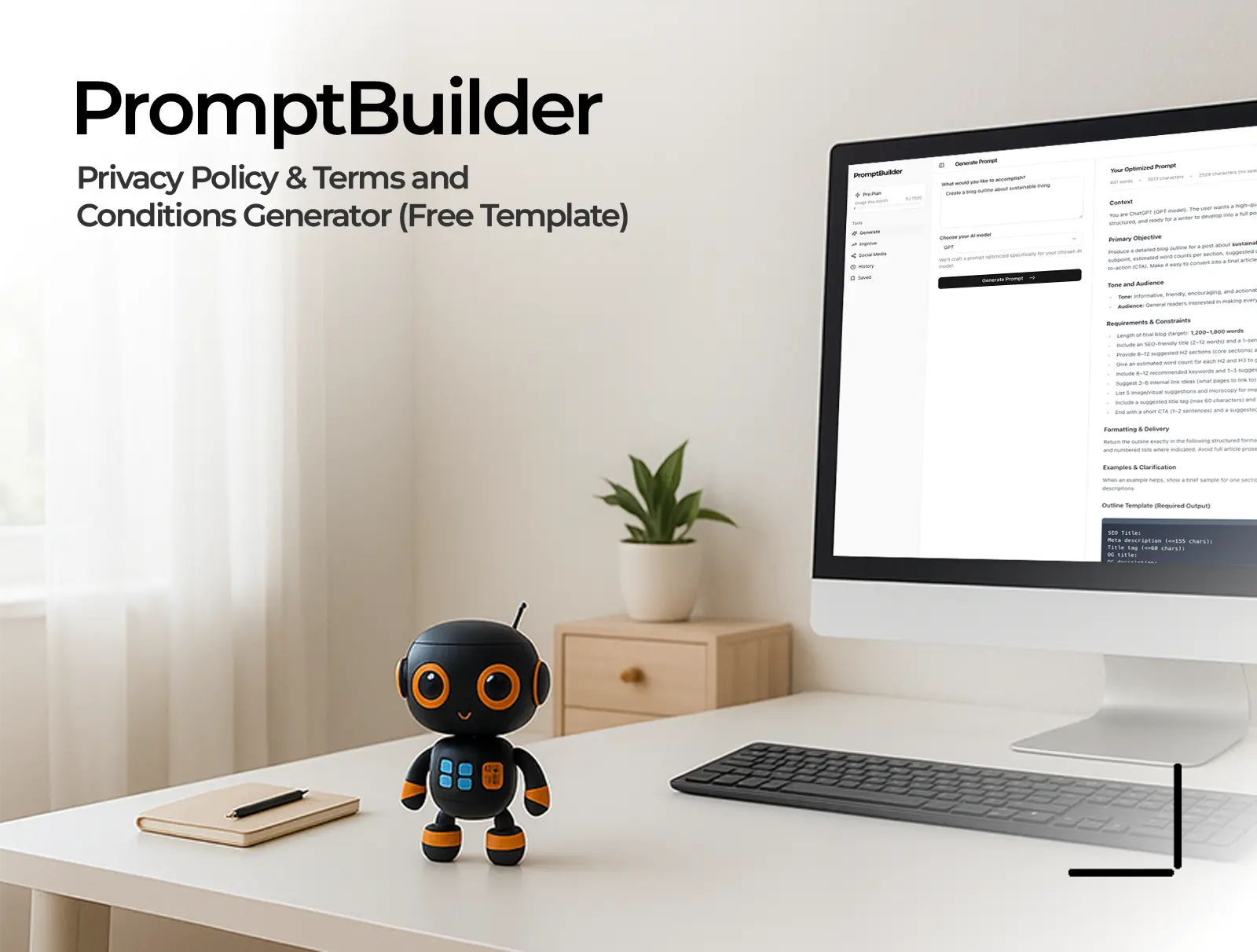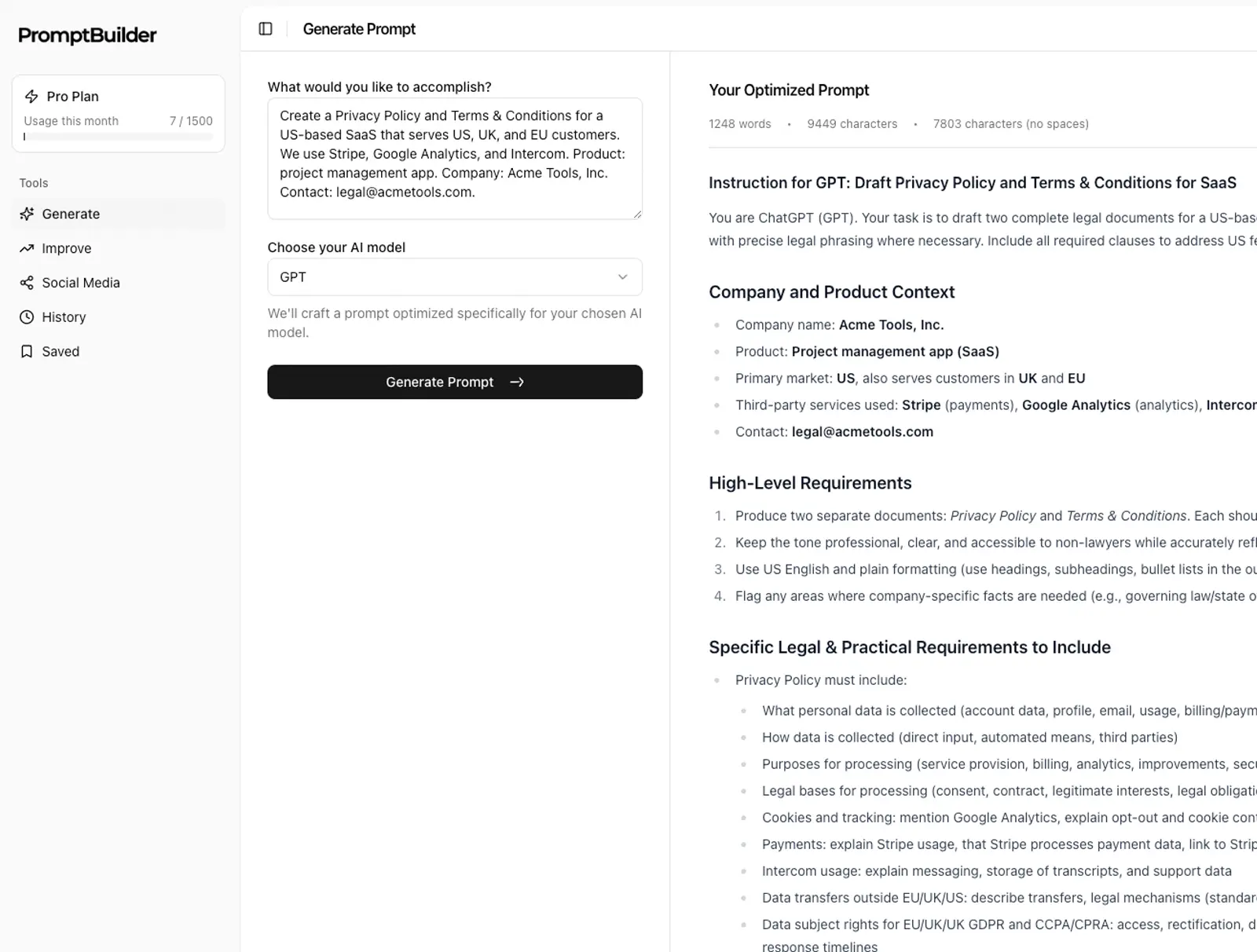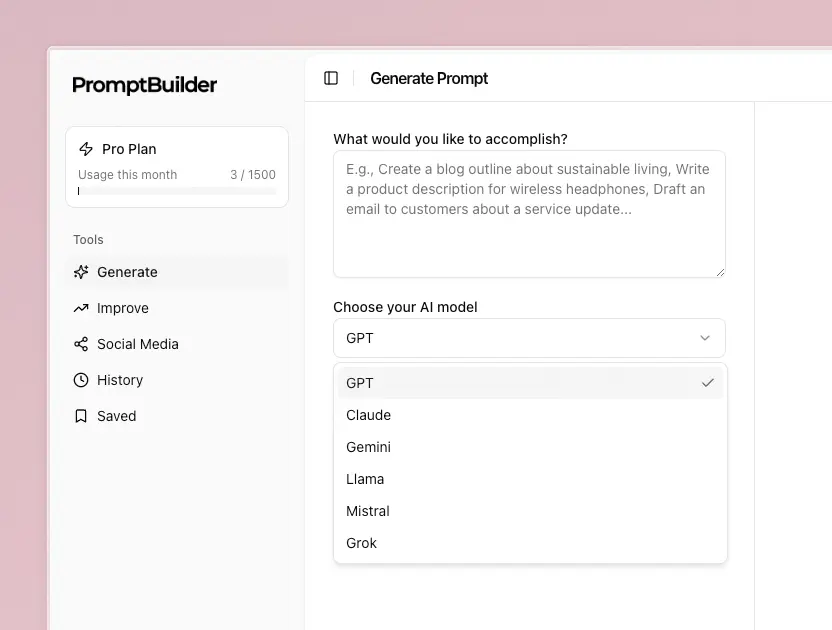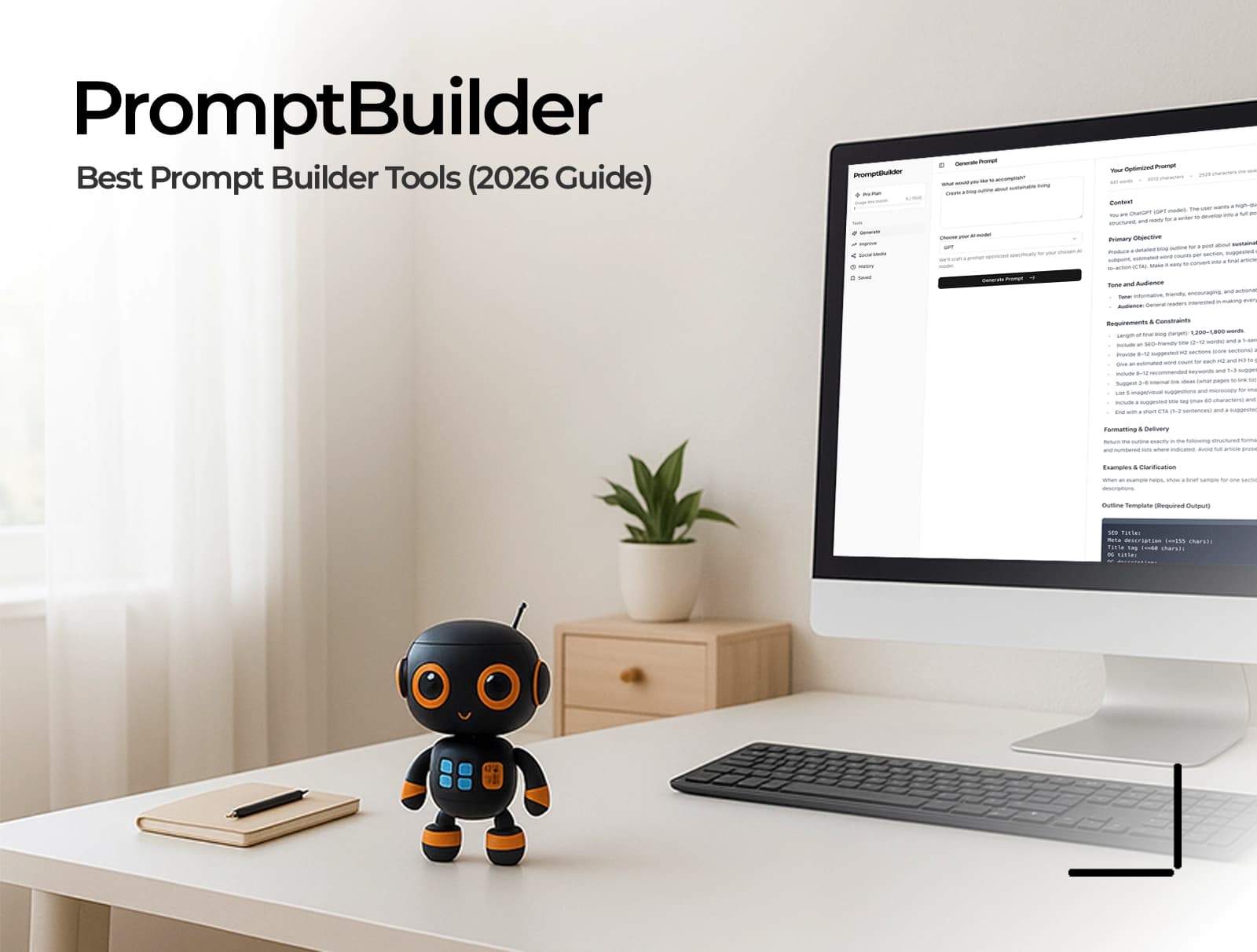Privacy Policy & Terms and Conditions Generator (Free Template)

Every website and app needs a Privacy Policy and Terms and Conditions. With Prompt Builder, you can turn a plain-English goal into a structured, legally-informed draft you can customize and publish fast.
This guide includes a copy-ready prompt template, a simple step-by-step workflow, and best practices for GDPR/CCPA‑friendly policies. Note: This is not legal advice; always review with counsel for your use case.
Why These Pages Matter
- Required by platforms and partners (App Stores, payment providers, ad networks)
- Expected by users and regulators (GDPR, CCPA/CPRA, UK GDPR, PIPEDA)
- Reduces risk by setting clear expectations (data handling, refunds, acceptable use)
- Improves SEO and trust: search engines and AI overviews favor complete, transparent sites
How Prompt Builder Helps
- Model‑aware prompts for ChatGPT, Claude, and Gemini that follow clear legal structure
- Jurisdiction and business‑model fields so drafts fit your context (SaaS, ecommerce, mobile app)
- Consistent sections and required disclaimers you won’t forget under deadline
- Reusable templates via Prompt Libraries for fast updates over time
Quick Start (60 Seconds)
- Open Generate
- Enter your goal: “Generate a Privacy Policy and Terms & Conditions for my website”
- Choose your model (e.g., GPT for ChatGPT)
- Click Generate → Copy the optimized prompt → Paste into your AI chat
- Review, customize, and publish to
/privacy-policyand/terms
Tip: Include your company name, jurisdiction(s), data types collected (analytics, payments), and contact email to reduce back‑and‑forth.
Example: Prompt Builder Input
What would you like to accomplish?
→ Create a Privacy Policy and Terms & Conditions for a US‑based SaaS that serves US, UK, and EU customers. We use Stripe, Google Analytics, and Intercom. Product: project management app. Company: Acme Tools, Inc. Contact: legal@acmetools.com.
Choose your AI model:
→ GPT (ChatGPT)

Copy‑Ready Prompt Template (Paste into ChatGPT/Claude/Gemini)
System:
You are a privacy, consumer protection, and commercial terms drafting assistant. Produce clear, plain‑language drafts with legally informed structure. You are not a law firm and do not provide legal advice; include a review disclaimer. Where information is missing, state assumptions and proceed.
Task:
Draft BOTH a Privacy Policy and Terms & Conditions tailored to the business below. Align with the named jurisdictions at a guidance level (GDPR, CCPA/CPRA, UK GDPR, etc.). Provide headings, concise explanations, and actionability for a website.
Business Context:
- Company/Publisher Name: {{Company Name}}
- Domain/App: {{Domain or App Name}}
- Business Model: {{SaaS | Ecommerce | Mobile App | Content Site | Marketplace}}
- Locations Served: {{e.g., US, EU, UK, Canada, Australia}}
- Data Collected: {{account data, billing, analytics (GA4), support chat (Intercom), cookies}}
- Processors/Partners: {{Stripe, Google Analytics, Intercom, AWS}}
- Contact: {{privacy@domain.com}}
Deliverables (use these exact top‑level headings):
1) Privacy Policy
- Introduction & Who We Are
- Personal Data We Collect (by category)
- How We Use Data (purposes + legal bases where applicable)
- Sharing & Processors (with examples)
- International Transfers (if any)
- Data Retention
- Your Rights (GDPR/UK GDPR, CCPA/CPRA)
- Cookies & Analytics (link to Cookie Policy if separate)
- Security Measures
- Children’s Privacy
- Changes to This Policy
- Contact Information
2) Terms & Conditions
- Acceptance of Terms
- Eligibility & Accounts
- Subscriptions, Billing, and Refunds (if applicable)
- Acceptable Use
- Intellectual Property
- Third‑Party Services
- Disclaimers & Limitation of Liability
- Indemnification
- Governing Law & Venue
- Termination
- Changes to Terms
- Contact Information
Formatting Rules:
- Use scannable H2/H3s and short paragraphs.
- Where a section depends on jurisdiction, label it (e.g., “EU/UK” or “California Residents”).
- Add a short note where custom input is needed (e.g., refund policy window, support email, DPO).
- Add a one‑line non‑legal‑advice disclaimer at the top of each document.
Constraints:
- Keep plain language; avoid dense legalese.
- No citations to specific laws unless directly helpful.
- Do not invent partner names or policies beyond what’s provided; use placeholders if needed.
Output Format:
# Privacy Policy
...content...
# Terms & Conditions
...content...
Paste the prompt above into your AI model, then customize details like refund windows, specific data processors, or cookie categories.
Best Practices Before Publishing
- Link these pages in your footer as
/privacy-policyand/terms - Add a dedicated
/cookie-policyif you use cookies or tracking scripts - Include a contact method (email or form) for privacy requests
- Note your data processors (e.g., Stripe, Google Analytics, Intercom)
- Record the “effective date” and log updates for version control
Compliance Notes (Not Legal Advice)
- GDPR/UK GDPR: Add a lawful basis section, data subject rights, and contact for requests. Consider DPO if required.
- CCPA/CPRA: Include California‑specific rights (notice of collection, opt‑out of sale/sharing, right to delete/correct) and a “Do Not Sell or Share” link if applicable.
- Cookies: Describe analytics/ads cookies and link to a cookie policy and consent mechanism if used.
- International Transfers: Note safeguards (e.g., SCCs) if transferring outside the EEA/UK.
Always have a qualified attorney review your final documents.
SEO and “AI Overview” Benefits
- Trust signals: Visitors and search engines value transparent legal pages
- Crawlability: Clear headings and stable URLs help SEO and AI summaries
- Topical coverage: Mention real processors (e.g., Stripe, GA4) and data categories for richer entity signals
- Freshness: Update when tools or laws change; add “Last updated”
FAQs
Is this legally binding?
Policies can be enforceable when properly drafted and presented, but this draft is generated content and not legal advice. Have counsel review and confirm it fits your business and jurisdiction.
Do I need a lawyer if I use this?
Yes—treat this as a structured starting point. A lawyer should review final text, governing law, venue, and refunds/liability language.
Where should I place these pages?
Create public URLs like /privacy-policy and /terms, link them in your footer, and reference them at sign‑up/checkout.
Do I also need a Cookie Policy?
If you use analytics, ads, or other trackers, publish a Cookie Policy and consent mechanism where required.
How often should I update the policies?
Review at least quarterly or whenever you add new processors, launch in new regions, or change data practices.
CTA
- Primary: Generate Policy (Free)
- Secondary: Prompt Libraries · Improve a Prompt
Tags
Related Posts


Best Prompt Builder Tools (2026): 11 Tools Compared
January 28, 2026

Using AI for Design Automation: A Layerre Guest Guide
January 10, 2026

